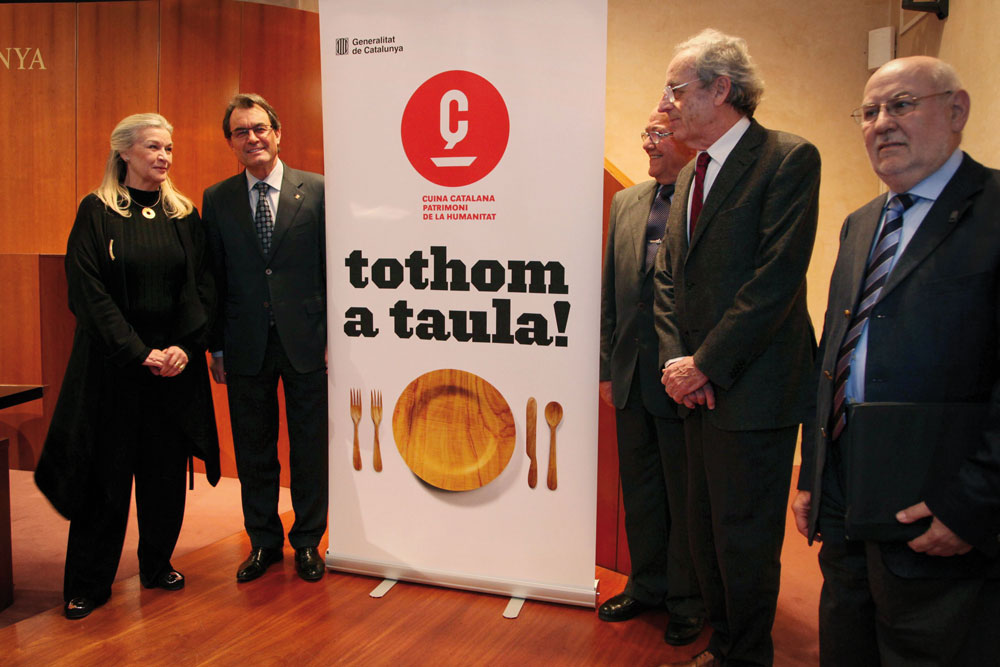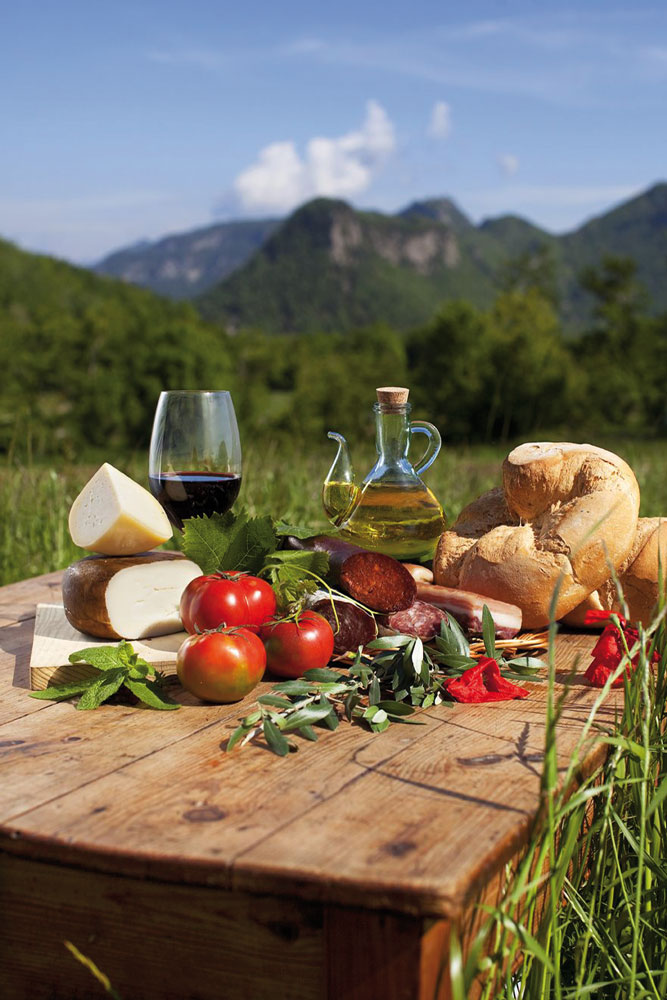Barcelona’s vast culinary potential has become an increasingly important aspect in tourism campaigns and has garnered institutional support and initiatives. Many renowned chefs have made an active contribution to the promotion of Catalonia’s markets and cuisine.

© Jordi Bedmar / Generalitat de Catalunya
Artur Mas at an event to support the campaign for Catalan cuisine to be declared intangible cultural heritage, held in February at the regional parliament, the Generalitat. Alongside the region’s President, Pepa Aymamí, Director of the Catalan Cookery Institute Foundation
In the 1970s, when resistance to Franco was still in full swing, Manuel Vázquez Montalbán, in L’art del menjar a Catalunya [The Art of Eating in Catalonia], published in 1977, drew an ironic and provocative parallel. The mission to save the language was fundamental, but he also deemed any parallel effort to save a part of the national identity that deserved its space in the collective memory equally legitimate. This parallel was clearly underlined in the subtitles of subsequent reprints: Crònica de la resistència dels senyals d’identitat gastronòmica catalana [Chronicle of the resistance of the distinguishing traits of Catalan gastronomic identity], or, in a more recent reprint, El llibre roig de la identitat gastronòmica catalana [The red book of Catalan gastronomic identity] – A kind of catechism against the trivialisation of papier-mâché gastronomy. Although it might have looked like a boutade at the time, it actually marked a watershed. Vázquez Montalbán himself, in the prologue to the reprint, recognises that while many of the recipes from 1977 were pure archaeology, the panorama had changed radically seven years later. The recovery came at the time of a major drive towards market cuisine, using fresh and quality products, which also characterised the French nouvelle cuisine.
France in the 1970s experienced the emergence of the nouvelle cuisine that championed market products, at the same time as the implementation of the Royer Law, conceived to protect local commerce from superstores – two actions to combat external influences that were deconstructing traditional ways of cooking and of the commercial fabric, and, in a nutshell, a way of life. The damage was patent in the loss of food quality, and in how a basic economic fabric was crushed, with the associated danger of depopulation of the city centres. The fact that the emergence of a market revitalisation policy came at the same time as the gastronomic renaissance cannot be regarded as fortuitous.
In the 1990s Barcelona began to promote the Mediterranean diet. Ancel Benjamin Keys had established a correlation between cardiovascular diseases and high cholesterol. He saw that lifestyle and diet in the Mediterranean regions seemed to favour a lower amount of this lipid in blood. These observations yielded an “ideal construct”, the Mediterranean-style diet, to promote an improved diet in the United States. The impact in the Mediterranean region took some years but it did eventually become an identity and promotion argument.
It is curious that a newspaper such as La Vanguardia should contain no reference to it until May 1987, and one which is by no means scientific at that: the actor Ugo Tognazzi mentioned it in passing during a visit to promote Italian pasta. Shortly afterwards the Minister for Agriculture was championing healthy eating habits and also highlighting the preference exhibited by shoppers for traditional establishments.
References are subsequently consolidated, and indeed they proliferate as of 1996, one year after the founding of the Association for the Advancement of the Mediterranean Diet, based in Barcelona, and supported by local enterprises. During the 1995 election campaign, the restaurant owners’ guild had called upon the Tourism Consortium to promote the Mediterranean diet in order to bolster Barcelona’s appeal. Some years later, and once again in Barcelona, the World Observatory of the Mediterranean Diet was created in order to have UNESCO declare the diet Intangible Cultural Heritage of Humanity, which it did on 2010.
Barcelona’s vast culinary potential has become an increasingly important aspect in tourism campaigns and has garnered institutional support and initiatives. One such example is the declaration of the Gastronomy Year (from March 2005 to March 2006), with a view to leveraging Catalan creative chefs and the Mediterranean cuisine tradition. Culture, including gastronomy, was regarded as one of the main attractions that bolstered Barcelona as a tourist destination.
Many renowned chefs have made an active contribution to the promotion of Catalonia’s markets and cuisine. Catalan traditional gastronomy has been fostered and systematised through the activities of the Catalan Cuisine Institute, which in 2002 promoted the Catalan Cuisine Guarantee Brand, in 2006 published Corpus de la cuina catalana [Compendium of Catalan Cuisine] and in 2011 the more ambitious Corpus del patrimoni culinari català [Compendium of Catalan Cuisine Heritage], and which initiated the candidacy of Catalan cuisine as Intangible Cultural Heritage of Humanity.



